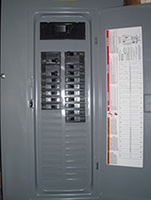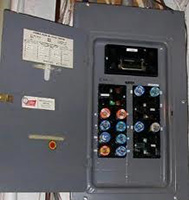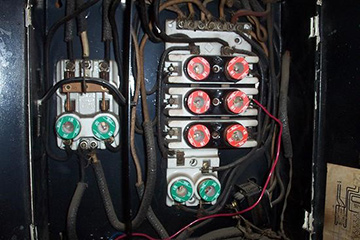

Breakers and fuses are both designed to trip (turn off) in the event of an electrical overload. However, breakers are mechanical and may be reset, whereas fuses typically are “one time only” and have to be replaced. Breakers typically offer greater protection, because modern technology allows for more sophisticated measurement and more precision tripping.
Both breakers and fuses are designed to trip when a circuit is overloaded. (And FYI, modern sophisticated fuses can often provide a level of protection greater than most breakers. But this is something more for industrial applications, and typically costs significantly more.)
Fuses often aren’t sized properly. Thus, a 30-amp fuse will fit into the same space as a 15-amp fuse. The whole purpose for any protection is to protect from having a fire. Doesn’t it make sense that protecting 15-amp wiring with 30-amp fuses is not smart? That’s a no-brainer.

However, keep in mind that replacing an old fuse panel (often in a kitchen cabinet) with breakers will lead to tripping when you don’t want it. You may need to add some circuits for those coffeepots, microwaves, or other high-demand loads that were on 15-amp wiring protected with 30-amp fuses. Thus, there may be a cost involved.
If you aren’t sure, call in an expert. Make sure they “know their stuff.” Call other sources you trust if in doubt.
Don’t risk your life or the life of those you love. Better to invest in the future and make sure it has a chance to happen than to end up wishing you had!
We’ll Never Leave YOU In The Dark!
